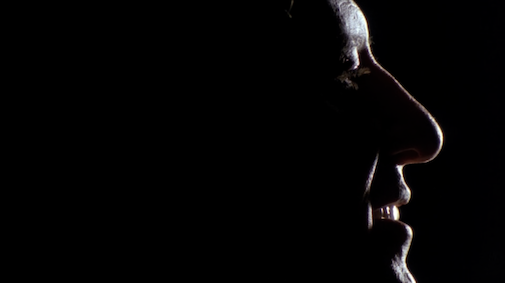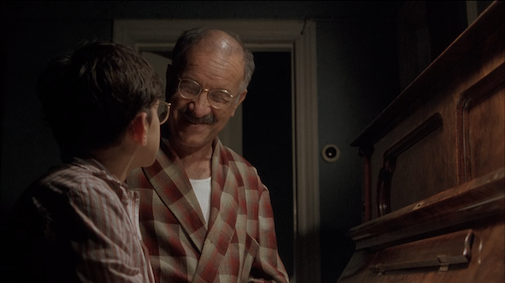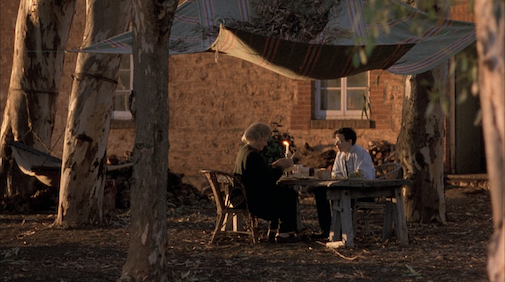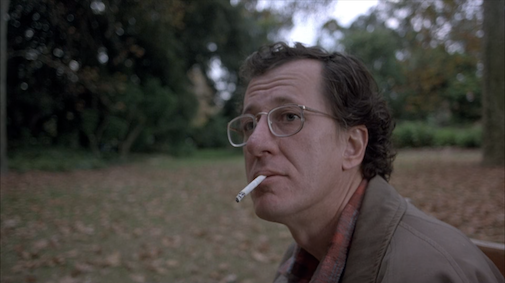25th Anniversary: "Shine"
 Sunday, November 21, 2021 at 7:00PM
Sunday, November 21, 2021 at 7:00PM by Nick Taylor

One of my favorite bits of This Had Oscar Buzz’s year in review episodes is the segments where they discuss a film that overcame its middling quality to cash in on their buzz and score with the Academy. This is the energy I bring to you for my 25th anniversary retrospective of Shine, an Australian film that copped seven Oscar nominations and a Best Actor prize for Geoffrey Rush in his starmaking role. I do not remember hearing or reading a single solitary comment about this film in the years since I became a cinephile. The closest I’ve ever gotten comes courtesy of folks sticking up for their personal pet among 1996’s Best Actor lineup, or scattered comments that Geoffrey Rush was better in his other nominated performances. It’s slim pickings, and having finally seen Shine for myself, I find very little of worth to really excavate here. Who’s to say how much the Artist Biopic has fundamentally changed from one decade to the next?
Our protagonist is David Helfgott (played by Alex Rafalowicz as a child, Noah Taylor as a teenager, and Geoffrey Rush as an adult), an Australian pianist who became famous in his youth and was institutionalized for years in his adulthood following a breakdown at a college recital...
Shine begins in extreme close-up on an adult David in profile, lit so only the outline of his face is visible as he rambles on about something or other at a mile a minute. He patters around on a rainy evening and nudging his way into a recently closed restaurant. A quartet of employees try to wave him off only to realize he needs attending to, and the one woman of the group takes it upon herself to get him home. We then cut to David’s youth, where his excellent performance at a recital and special distinction prize can’t reconcile his father Peter (Armin Muehler-Stahl) with the fact that the boy didn’t get first place, and is therefore a loser bitch. Peter has been teaching his son how to play piano his whole life, instilling in him the sense that he should be lucky to learn music in a warm home when his own father cruelly denied him those things, and we quickly recognize the man as a gentle terror. One of the judges stops by the Helfgott’s home and offers to give David private lessons, which his father initially bristles against but eventually allows.

Shine sporadically feints at presenting David’s adult and childhood selves on parallel tracks, but this device is only maintained for two scenes before just showing us his life in sequence. Once the bit about David’s childhood has ended, we see his Geoffrey Rush self get taken home from the restaurant that same evening, and as soon as he’s safely tucked in bed the film shoots to his young adulthood, with Noah Taylor taking the reins of the film for a good 45 minutes, with only one further interruption from Rush. David has grown up to be a tremendously awkward teenager playing at concerts and competitions. He eventually becomes a doted-on friend of Katharine Susannah Pritchard (Googie Withers), a co-founding member of Australia’s Communist Party whose political history is never once explored in the film. Peter has kept up his warm, domineering demeanor, and is now denying him permission to leave Australia for more prestigious opportunities abroad.
What persists through each chapter of David’s life is the profoundly superficial sense of engagement from Scott Hicks’s direction and writing. It’d be one thing if the script solely traded on cliches (which it absolutely does), but Hicks’s direction barely dives beyond the shallow outlines of his own script. Some craft aspects show well - David’s mid-film concert is the most we ever get in his headspace via film craft - but the uniform proficiency adds to the impression that Shine’s lack of POV bleeds is as much an aesthetic strategy as it is a narrative choice. Where the hell were all these craft nominations for Breaking the Waves or Portrait of a Lady? I’m not asking for the structural daring or formal elegance of Pain and Glory, but even by the standards of conventional biopicking, the handful of emotional high points and memorable images aren’t worth the dull sense of skating the surface of a fairly interesting life.

The most damning takeaway is that Shine never suggests any sense of David’s interest in music independent of any outside influence. Does he actually care about the piano? Do his loved ones and caregivers only see value in him based on his artistic skills, or in how David’s talents reflect on their skills as a parent, a teacher, or a lover? Does he only see value in himself based on his artistic skills? Shine tells us none of this, and it hamstrings David’s interpreters from sharing their own thoughts on the matter, whatever their efforts to highlight how such a sheltered, decent, talented, fundamentally helpless personality might navigate the world they’re living in. Taylor does a better job of playing this big ball of nerves, while Rush’s acting seems to have started and ended with the vocal and physical tics David accumulated after years in a psych ward. Also, did Rush seem like an odd continuity choice with Taylor to anyone else? One has to ask what Hugo Weaving was up to at the time. I wonder if Taylor and Rush are adding nuances that Hicks’s camera simply isn’t picking up, but it’s still maddening that we learn so little about the man this movie is literally built to showcase. He’s not so much a person or even an enigma as an empty vessel, nattering on and ready to do whatever anyone asks of him.
Armin Muehler-Stahl quite easily walks away with the whole thing, conveying a tender, even affectionate father who genuinely cannot recognize how he’s become as monstrous to his own family as his father was to him. I don’t believe he’d recognize his behavior as wrong or cruel, even if he recognizes the cruelties done to himself and others, and he makes the man’s tyranny all the more convincing for it. Lynn Redgrave is also quite moving in the last section of the film, though it’s funny that Hicks cordons off his “power of true love overcomes mental illness” portion of the film to its last 20 minutes.

I don’t know, honestly. Have I said enough about a movie I’ve reduced as hopelessly superficial?
Did this not have the kind of legs that could hold it up for 25 years, or am I right to ask why this had heat in the first place? Would you, dear reader, have a defense for this, or would you rather just list off some other favorites from 1996? It was a very good year for movies, you know. Shine just isn't part of that immortal crop.



Reader Comments (17)
Totally agree with you here. Though I was in high school in 1996, I was already an Oscar fanatic and rushed out to the arthouse to see what the buzz was about. I was a pianist and felt like I'd love this movie. All I remember is that I was bored to absolute tears and couldn't understand a word Rush said. 1996 was the year I fell in love with small films, but I've never understood why Shine was such a big movie that year or why Rush won the Oscar.
The '96 winner should have been my favorite leading male performance of all time: Nathan Lane in The Birdcage, sadly not even nominated. Of the nominees, Billy Bob Thornton made by far the biggest impression on me in a role I still think about 25 years later, whereas I wouldn't rewatch Shine for less than $1000.
1996 was the first year I followed the Oscars!
I remember being surprised how little Rush was in the film. It seemed kind of crazy to me at the time that such an unknown actor cruised so easily to the Best Actor statuette with so little screen time. I rewatched the film a few years ago and liked it, but I admit it didn't stick with my memory very well.
Remember when the real Helfgott went on tour around the time of the Oscars? His reviews were mixed at best, if I'm remembering correctly.
overrated then, forgotten now
the australian film institute awards overpraised it as well [nine wins from twelve noms] where there were a bunch of lower budget films that would've made for better winners: children of the revolution, love and other catastrophes, love serenade, floating life
i understand how geoffrey rush's ACTING made the oscar line up* but picture and director? when trainspotting was right there??
*my vote for best actor would've gone to william h macy [who was nominated in the wrong category]
My choice for Best Actor that year was Eddie Murphy for The Nutty Professor. His performance was a marvel and deserved the accolades he was denied. Too often AMPAS fails to pay proper respect to comedic brilliance.
I remember there being a tiny bit of grumbling about how Noah Taylor actually then most of the heavy-lifting in the film, but nonetheless, Rush basically steamrolled that year. In retrospect Rush's dominance is a bit surprising considering the big-time competition. You had Harrelson stepping up his game big time, Fiennes taking the indie-spin on beautiful old-fashion star turn, and the biggest star in the world doing arguably career-best work with Cruise. Thornton also had a great emerging star narrative, but I think people always figured he had a better chance at screenplay, which ended up being the correct assumption.
I guess the draw of a real-life person was too much for the Academy to ignore, especially because Helfgott was out there on the promotional tour. I do remember reading some articles about regardless of how inspirational the story was, he "technically" wasn't a great musician, but goodwill was certainly there overall.
I, for one, am just glad that Geoffrey Rush has an Oscar, but, yeah lol
Other examples of bad movies overcoming its quality are Darkest Hour and BOHEMIAN RHAPSODY, so most of the Best Actor winners.
@StephenM: To your point about his screen time, that was one of the few instances I’m aware of when one of the nominated actors actually made public comments about category placement, as Woody Harrelson expressed disappointment that Geoffrey Rush was nominated in the lead category despite having relatively little screen time, as Harrelson felt he might have won had Rush been in the supporting category instead. Honestly, even if Rush had been nominated in the supporting category, my guess is Cruise would’ve won Best Actor, but still, the fact that Harrelson commented on it back then is interesting.
According to ScreenTimeCentral.com, Rush is on screen for 29.8% of the movie, which to me is right on the cusp, so I’d say the category placement is arguable. I do think it’s very surprising in retrospect that he steamrolled his way to a win in the Best Actor category despite being relatively unknown at the time, giving sort of a one-note performance, and having not nearly as much screen time as his fellow nominees.
Sums up exactly how I felt after seeing it a 2nd time my opinion never changed,Rush is very actorly,theatre thesps sometimes forget to dial it back,Mueller Stahl stole the mevie and was at that time a surprise in supporting actor.
I'm a Thornton or Cruise voter,Fiennes spends too much time in bed.
I liked Rush just fine, but the film was totally unimpressive. Playing Rachmaninov's 3rd piano concerto leads to insanity? And critics parroted that bullshit? Just about every classical pianist gets around to recording it! It's one of the most popular pieces of all time. Even though Rush was ok, my vote is firmly for Fiennes. He was outstanding. And I completely agree with Finbar McBride. Eddie Murphy is the year's dumbest omission.
I didn't dislike this movie that much, it was kind of (shrugs shoulders) - mostly I remember thinking 1) Taylor > Rush in this, and 2) hey, I should listen to more classical piano performances (which I did, and enjoyed).
Rush's win is nowhere near as appalling a win as Malek's, but this really felt like the year Tom Cruise should've won his Oscar.
@Doug and Finbar McBride - I still need to watch those! Seen bits and pieces of The Birdcage on TV but never the whole thing.
@StephenM, Val, and Edwin - I didn’t know that about Harrelson! Good for him on asking, even if I’m not sure he would’ve the winner without Rush there. It’s definitely weird categorization, and for a steamroller to boot, but I prefer it to Lion pushing Dev Patel supporting just because there’s two leads.
@par and Mr Ripley79 - I honestly didn’t even get much from Rush’s performance. It’s relentless, yeah, but the warp-drive mumbling is a weird register for me to consider showboaty or theatrically overscaled. Makes me appreciate the ham he’s serving in Shakespeare in Love and Pirates.
@Fadhil - I can’t say I’m super loyal to Rush, but he can be very fun. Where would you send someone who wanted to see more of him? Also, agreed on biopics.
@Amy Camus - Can’t believe Rachmaninov personably put David in the hospital. The way Shine handles his relationships with his musical talent and mental health is just so maddening.
@Everyone - To add three more names to the list of egregiously unrecognized leading men this year, I’d go hard for Timothy Spall in Secrets & Lies, Chris Cooper in Lone Star, and Joe Pantoliano in Bound. Spall especially feels like an unforgivable omission to me, but all three of them are exemplary in their films.
Didn't deserve a single nomination
I finally got around to watching Shine about 10 years after it was made, and I remember being totally shocked that it had won that much acclaim. Reminds me of another Rush movie: The King's Speech. It's fine, but I never want to watch it again, either.
I read this with interest, as it's one of the few BP nominees from the mid-to-late-90s that I still haven't seen. I agree with those who have cited Eddie Murphy as a worthy Should've Been nominee, but great as he was, I think the movie's rather juvenile sense of humor sunk his chances (I doubt all those fart jokes went over well with the more staid members of the Academy). I also agree that Timothy Spall would have been a swell nominee--along w/ Fargo, S&L is easily my favorite of all the films that year. He was superb, as ever. Anyway, Rush's performance must have been just of that cultural moment, for whatever reason(s), but one of those moments that quickly faded with time. Anyway, Nick, you actually made me want to make the effort to finally see Shine now, to judge it all for myself! Thanks, as ever ~
As I recall Rush was aided in the Oscar race by the previous year's Best Director recipient, Mel Gibson. Gibson and Rush had been roommates in Australia during their struggles seeking fame. Gibson championed Rush while Elizabeth Taylor was a vocal supporter of acting and screenplay nominee Billy Bob Thornton. Both newbies went home with an Oscar that night.
There are a lot of undeniable classics that won Oscars and are therefore, by default, "Oscar movies": IT HAPPENED ONE NIGHT, CASABLANCA, FROM HERE TO ETERNITY, MIDNIGHT OOWBOY, THE GODFATHER PART II, ANNIE HALL, UNFORGIVEN... But SHINE, which I know only won Best Actor, represents a specific kind of Oscar movie (maybe Oscar-Bait Movie is the right term.) It's the kind of film that when you see it you're moved, impressed, come out saying "I just love the movies!" But then after six months you can barely remember why you liked it and you never in your life go back and watch it again. Others in this sub-category: THE KING'S SPEACH, THE ENGLISH PATIENT, SLUMDOG MILLIONAIRE, THE ARTIST.
Personal anecdote: I saw SHINE at the Sundance Film Festival's premiere. I was sitting next to the critic Shelia Benson (very nice person), and I must say I've never sat next to someone who, even in my peripheral vision, communicated their utter love of the film they're watching. She gasped, laughed, cried, sighed. I didn't have to wait for her review to appear in the LA Times later that week to know she loved the film.
Your writing is better than the film. What a superficial flick and Oscar-winning performance. If anyone had to win a little golden man from SHINE, I wish it had been Armin Mueller-Stahl or Noah Taylor. Or even Lynn Redgrave, despite the smallness of her role. As you wrote, she's quite moving in a limited part.